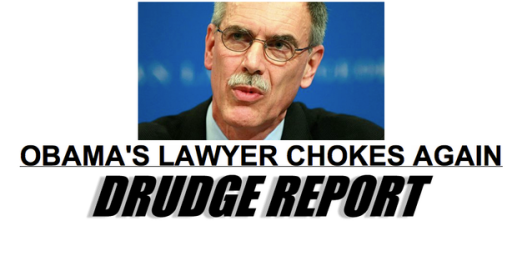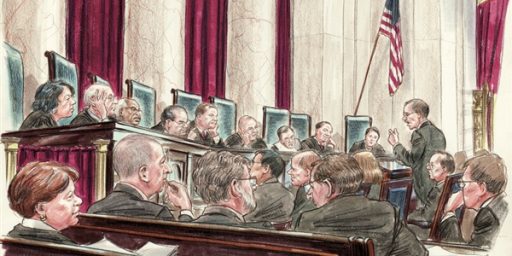ObamaCare Mandate Limiting Principle
The Solicitor General was unprepared to answer the most predictable question on the ObamaCare insurance mandate.
Opponents of the healthcare reform law pushed through by President Obama have been asking a simple question for two years: If the government can require citizens to purchase health insurance, what can’t it do? Shockingly, the administration was unprepared to answer that question today before the Supreme Court.
Sarar Kliff for Wonkblog (“In mandate hearing, a battle over ‘limiting principle’“):
“Limiting principle” is a phrase that came up a lot in the Supreme Court Tuesday morning – 15 times, according to the transcript. It’s a legal concept you’ll probably hear a lot about in this afternoon’s analysis.
When courts review a new application of Congress’s constitutional authority, they historically wanted to see the government articulate a clear limit to those powers – they look for, in legal jargon, a “limiting principle.”
“If Justice Anthony M. Kennedy can locate a limiting principle in the federal government’s defense of the new individual health insurance mandate, or can think of one on his own, the mandate may well survive,” writes SCOTUSBlog‘s Lyle Denniston. ” But if he does not, the mandate is gone.”
The core question, for Kennedy and the eight other Justices, seemed to be: if Congress could require individuals to purchase health insurance, where do the limits of power stop? Here’s one part of the arguments, where Justice Kennedy questions Verrilli particularly aggressively on the point of where, exactly, Congress’ limit of powers ends:
JUSTICE KENNEDY: Can you identify for us some limits on the Commerce Clause?
SOLICITOR GENERAL VERRILLI: Yes. The — the rationale purely under the Commerce Clause that we’re advocating here would not justify forced purchases of commodities for the purpose of stimulating demand. We — the — it would not justify purchases of insurance for the purposes — in situations in which insurance doesn’t serve as the method of payment for service
JUSTICE KENNEDY: But why not? If Congress —if Congress says that the interstate commerce is affected, isn’t, according to your view, that the end of the analysis.Cuccinelli recalled Chief Justice John Roberts asking why health insurance is unique as something the government can require Americans to purchase. Justice Antonin Scalia then chimed in, asking whether the government could require Americans to exercise, a regulation that would presumably also lead to improved health.
“If you can compel people to buy health insurance because health care is unique,” Cuccinelli recalls Roberts asking, “Why aren’t there a bunch of other things that you can compel as well?”
Supporters the law agreed that limiting principle seemed to be a key issue that the Justices were grappling with the arguments.
“What they’re wrestling with, is the question of if this is allowed, is there no limit to what Congress can do under the Commerce Clause?” said Sen. Tom Harkin (D-Iowa) who attended the hearings.
Now, as we’ve noted here countless times in the debates on this matter, there’s zero doubt that Congress has the power to accomplish the same goal in a way that’s only technically different under the taxation power. That is, they could simple raise everyone’s tax bill by the amount of the current penalty for being uninsured and issue them a 100 percent credit for years in which they were covered by insurance. But they wouldn’t have been able to get 60 votes in the Senate for that, so they settled on the mandate mechanism instead.
Given how often it has been asked in the debate, that this question was going to arise was a given. It’s shocking that Verrilli didn’t have a more compelling answer at the ready.







I guess Scalia has been reading the wing-nut blogs and is captivated by the broccoli argument. So much for the intellectual leader of the conservative court.
As I said in SLT’s quick prediction post yesterday…overturned along party lines…precedences and consequences be damned.
@Hey Norm: I think the “broccoli” argument and Scalia’s “exercise” variant are perfectly reasonable reductio questions. The point is use an absurd example to see if there’s an explanation why it would be too far. If the only answer is, “Well, you couldn’t get enough votes for that,” then the answer is that we don’t have a written Constitution.
@James Joyner:
Logically that’s still a bad argument. Unless the constitution is based on the premise that it’s powers are limited by some abstract “well you can’t do anything unreasonable” concept, then it’s sort of immaterial. Congress could declare war on Canada everytime there is a lunar eclipse… pointing this out doesn’t magically mean the power to declare war is limited. It means that the writers of the constitution thought the checks and balances of the government were enough to safeguard against stupid declarations of war.
Legally, the argument is alright, but only in the cynical way that any argument that persuades someone is valid legally.
Since this question was bound to be asked, the lack of a hyper-prepared response could lead to conspiracy mutterings. Is it too difficult to argue on two consecutive days in front of SCOTUS?
@Console:
That doesn’t make any sense at all. The power to declare war is vested in Congress and they could indeed do exactly that perfectly legally. They choose not to for political and human reasons, not Constitutional ones.
The argument under consideration here is more basic. Unlike England, we have a written Constitution with limited powers delegated to the central government. In England, anything Parliament does is, by definition, constitutional. Here, passage by the Congress and signature by the president does not confer Constitutional legitimacy; the courts can still strike it down. It happens with some frequency, in fact.
Scalia also said that if less people buy cars the price would be more expensive which
shows his complete lack of understanding the Marshallian demand curve.
Also, I know that car insurance and social security is compelled on people, but if you don’t drive or are employed you aren’t still taxed, so those aren’t good analogies.
But the draft to me is a good analogy. Whether you are for or against war, the government compels you to serve in the armed forces.
How is the health mandate different if it compels one to join in the risk pool?
The Constitution does not prohibit stupid laws. It prohibits laws that violate our liberties. Free-riders violate my liberties. If you participate in the health-care system…then you should be required to carry health care insurance in order to force your personal responsibility and to protect me from your idiocy.
Again…I fully expect this to be over-turned. But I don’t agree with it. I also don’t agree with Citizens United, Bush v. Gore, or the New London Eminent Domain Case. Call me crazy.
By the way we already buy mandated insurance. It’s called Medicare.
Norm,
Kelo (the New London eminent domain case) upheld the use of eminent domain in that circumstance. It just was then used to rile up opposition by people too unscrupulous to point out that eminent domain has been used for private benefit within 20 years of the Constitution being ratified (for private canals) and consistently thereafter.
@the Q: While I don’t agree with it, military conscription is specifically envisioned in the Constitution and a power of government that the Framers considered inherent.
@Hey Norm: “The Constitution does not prohibit stupid laws. It prohibits laws that violate our liberties.” Actually . . . no. It enumerates certain powers that the government has and declares specific liberties that can’t be infringed upon. When those clash, the Courts render decisions.
@Hey Norm: Medicare isn’t insurance, it’s a federal welfare program that we’re forced to participate in. It’s funded by the tax power, which the Constitution vests in Congress.
@James Joyner:
The very makeup of congress (it’s more than one person), the fact it’s elected, the fact it can’t execute it’s laws, etc. etc. All of these things exist to keep the government in line. Not just article one section 8. The idea that the expansive interpretation of a power is scary doesn’t really change all the roadblocks put in the constitution to keep expansive powers in check. And yes, congress is explicitly granted some rather expansive powers.
@Console: I don’t understand what point you’re making. The mere fact that Congress manages to pass a law doesn’t render it Constitutional. All manner of laws have been struck down over the years, going back to the 1800s.
Right…which does nothing to prevent stupid laws. Congress has long had the ability to pass a law requiring us to purchase broccoli. (They cannot pass a law requiring us to eat it) The fact that they haven’t proves that politics is in fact a limiting factor.
The idea that Medicare is a “federal welfare program” probably came from the same wing-nut site as the broccoli argument. Medicare is a public sector insurance program that spreads the risk amongst us all…as opposed to private sector insurers that must manage their risk portfolio.
Absent the PPACA Mandate let’s just all agree that we will no longer provide medical care to everyone regardless of their ability to pay. That protects my liberties.
Is the issue the extent of the Commerce clause or rather the application of the Commerce clause to the case at hand. If someone proposed making broccoli mandatory, then we could discusss the application of the clause to that case at hand. It seems to me that bringing such reductio ad absurdum arguments in actually confuses the issue. It is clear that health care is a national commerce issue and a very important one and regulation is allowed. I guess the Supreme Court can explore any way they want. As another blog noticed, most of the arguments have also been made in written briefs and this public part is theater.
@Hey Norm: No, the argument here is that Congress actually DOES NOT possess the right to force Americans to buy broccoli. Mere political consensus does not confer absolute power. There are all sorts of stupid laws that are perfectly constitutional and probably all sorts of really good ones that Congress lacks authority to pass. That’s the nature of limited government.
That Medicare is a federal welfare program is simply axiomatically true. Everyone of a certain age gets it without regard to how much they paid in or their individual behavior. It’s not “insurance” in any meaningful way.
And, yes, I fully agree with the principle behind the mandate. If we’re going to mandate that ERs provide treatment, we ought to mandate treatment out of principle. But the fact of the matter is that the former is within the power of government (because it licenses hospitals, mostly) and the latter is not.
@ James…
You are right about broccoli of course…not sure what I was thinking there.
Thanks James, of course….I forgot the draft is an enumerated power….
What about the wage and price controls of both FDR and NIxon during the 70s.
Were they fought in courts? I think parts of the New Deal were ruled unconstitutional but I am
not sure if the wage and price controls were. And if so, how did Nixon get away with it.
My point is that as much as I want the mandate to pass muster, its hard for me to see
a precedent, hence the wage and price control argument where all business and companies were
compelled to follow gov’t edict in what they could receive and charge.
But then, SS is compelled on all workers and this isn’t similar to the ACA mandate.
It seems that regardless of ideology (and I am a lib) I just can’t see this passing. It will be interesting to read the dissenting opinion if it loses.
Yet another good reason to enact a single-payer system…
@James Joyner:
My point is that the whole “reducio” argument isn’t a valid way to interpret the constitution. The constitution more limits built in than just enumerating powers, and doesn’t require inserting invisible disclaimers on the said powers.
The government’s power to tax is unequivocal and barely restrained. Saying “well if that’s true then the government could make all sorts of destructive taxes” isn’t an argument that invalidates the fact the government has that power. Likewise, the fact that the commerce clause can be interpreted expansively doesn’t mean the “broccoli” argument magically limits the clause.
As for which way the Court will go, psychologically, it seems to me that questioners would be tougher on the arguments they agree will in order to protect themselves from criticism later. Of course, this argument may be wishful thinking on my part.
@James Joyner:
I think the limiting principle is clear, even if it wasn’t articulated as well as it might have been. The mandate is within the commerce power because it is an integral and necessary component of a complex of regulations governing the market for healthcare, and that complex of regulations is clearly covered by the commerce power. If you can imagine a mandate to purchase broccoli that was similarly critical to regulating a major market, then it would be acceptable. Absent that justification it is not.
@DRE: Combined of course with the fact that everyone is a part of the market for healthcare.
Lack of broccoli won’t kill you
No one has to give you broccoli if your lying in a pool of blood in front of a hospital.
Emergency wards don’t have a duty to give you life saving broccoli.
Not buying broccoli and then getting sick or in an accident will not raise the price of broccoli for everyone else.
Broccoli does not cost 1500 a month.
no one ever went bankrupt because they had to have broccoli.
I could do this all night.
Somewhat amusingly, Congress does have the right to force Americans to not buy broccoli and to not consume it, even if they grow it in the their basements just for their own personal consumption.
At least, that’s what Scalia argued for in Gonzales v. Raich, in reference to another crop.
Why is it a “mandate” if it is not deemed a crime not to buy it? You just pay more in taxes if you don’t; that doesn’t mean you have to buy it any more than child tax credits is a mandate to have children. I’ve never heard the Supreme Court insist on a “limiting principle” test to question whether a particular exercise of the tax authority is constitutional, why does there have to be one for the commerce clause? (I’m assuming there is a reason, so I’m asking, not arguing. At least not yet).
The argument goes that the interstate commerce clause gives the federal government too much power.
The implication is that the federal government has somehow used the commerce clause to usurp the powers of the states. This is wrong; the expansion of federal power has simply expanded along with the explosion of interstate commerce. The constitution does not put limits on the areas of interstate commerce the federal government can regulate. The solution for many who oppose this expansion is to use an activist court to put unconstitutional limits on the power of the federal government to regulate interstate commerce by judicial fiat. The fact is that if you want to limit the power of the federal government to regulate interstate commerce then there is a simple and straightforward remedy to accomplish that. Simply amend the constitution to limit the power of the federal government to regulate interstate commerce.
@Rick DeMent: The Commerce Clause has long been interpreted broadly and, yes, the degree of interstate commerce has expanded over time. Still, it’s never been viewed as a license for Congress to do anything it wants. Certainly, we’ve never tested whether Congress has the power to compel people to engage in commerce by purchasing products. The job of the courts is to referee such disputes.
If we do not have Medicare For All, then apart from the individual mandate, how can an insurance pool function in a way that avoids having uninsured?
It seems to me that the Justices will invalidate ACA, and essentially say, “you should have passed a true Single Payer Plan.”
@James Joyner:
Right no one is saying the feds can do whatever they want, what I am saying is that the transformation of interstate commerce from a small side show in the late 18th century to the utter and total dominance of economics today would necessarily expand the power of the fed in that regard. The problem is that no one at the time when they were writing the constitution thought to put explicit limits on the commerce clause since it was essentially self limiting. The issue is that the plan meaning of the words written give the federal government this massive power which people do seem to want it to have.
But make no mistake, there is no argument that you can make to limit the power under the commerce clause that isn’t at it’s core activist because the founders never thought to put any limit on the power the constitution grants the federal government under the clause. So if you want to limit the power you have only two choices, amend the constitution or have an activist court place extra constitutional limits on the power by judicial fiat. It looks like this court will take that latter course.
On the bright side we get to have a poster child case for conservative judicial activism to the extent that Bush vs Gore wasn’t enough.
Rick DeMent: but the “activist court” would still have to figure out and articulate what are the newly stretched limits of Congressional constitutional power/authority under the Commerce Clause. Up to this point, activist courts were able to do that, but were struggling to do so in this case. How/where would you “locate” a limiting principle provided that ObamaCare is constitutional?
A very nice discussion of the “broccoli problem” and, incidentially, a good example why lawyers should never tackle complex legislation without an economist at hand can be foundhere if someone is still interested.
Edit: The broccoli is here. That last link is a broader discussion of Tuesdays arguments instead.
@PGlenn:
The activist court can do what ever it want’s (sadly)
further, I would say that the constitution as written allows the federal government to regulate commerce among the several states and whatever I might think of ObamaCare, (not much BTW) as long as the individual mandate was voted on by the congress as an essential part of heath care regulation we’re stuck with it. Congress is free to change the law (hello single payer) and the constitution can be amended. Those are the remedies.